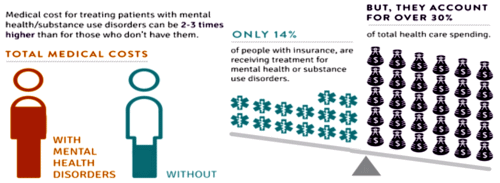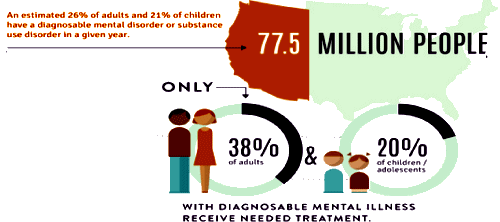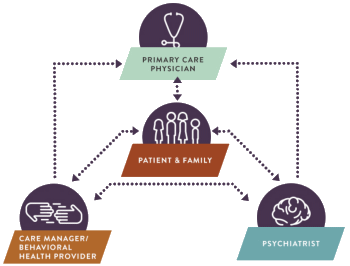
The Role of Psychiatry in Health Care Reform, APA Board of Trustees Work Group and the Economic Impact of Integrated Medical-Behavioral Healthcare: Implications for Psychiatry, prepared by Milliman, Inc.have an accompanying Infographic designed to simplify and illustrate their concept of Integrated Care. Shown above is their assessment that mental health care is inordinately expensive. That was accompanied by saying that while the need for mental health care is great – the patients are underserved:

It reminds me of the opening gambit for much of the industry funded clinical trial literature from the last decade – the public health burden of mental illness. In this case, we need more services and lower costs. I felt gamed reading it. That aside, they propose this model [I’ve extracted the small print for each element below]:

[redrawn for clarity]
|
• Makes initial diagnosis and prescribes medications
• Modifies treatment based on patient preferences,needs, and psychiatrist recommendations
|
• Identifies goals, needs, and preferences for treatment
• Participates in regular screening
|
|
|
|
||
|
• Monitors all patients in practice
• Provides education
• Tracks treatment response
• May offer brief psychotherapy
• Assures patient engagement
|
• Provides team leadership
• Reviews caseload regularly
• Educates and consults
• Sees patients who are not making improvements
|
|
By my read, the care of patients with mental health problems falls to primary care physicians with review/consultation with psychiatrists. The patient is followed using rating instruments by a case managers/mental health types using some kind of rating scale. Brief psychotherapy may be offered. The psychiatrist reviews the patient’s progress and sees treatment failures. The model is obviously focused primarily on symptom reduction – objectified on rating scales.
![]()
Dr. Summergrad was on the workforce that produced this plan. He talks about it in this presentation:
Gamed? Yes, you are.
Business-speak: Gamification
What I notice is number one on the list is medication, not the place to start in my book. Where is the conversation to define the problem?
Steve Lucas
Steve,
Since the discussion on the nature of business in healthcare, I have been thinking about the model of selling services to the public though unnecessary procedures and tests. However, with the exception of the recommended screenings, I haven’t seen this for quite some time in my area of the country. Here I’ve had to fight to get lab tests as simple as free T4 and Vit D. I will say that around here, they bought into the managed care mindset early on. I can remember in the mid-90s, hospitals bragging about how they only used one MRI between the three of them.
Now that insurance companies have more clout though, I consider this model almost dead. I get the impression that the dynamic is now much like Walmart’s with their suppliers. Walmart meets with them and tells them how much they will pay for their product. So, now we have health insurers able to tell providers how much they will pay them for each line item. Providers in turn shift the focus to cost containment. In reading about the costs of healthcare, I found many references to the overuse of services by those with unexplained medical symptoms. Estimates ranged from 15 to > 50% of visits to primary care have no identifiable organic disease associated with them. If this is true or even believed to be true by providers, this is where they can start bringing in alternative medicine and counselors to deliver something to make patients feel better that is relatively inexpensive. For someone with a rare or unknown disease, it makes it that much harder to get care.
With that said, I am trying to figure out where pharmaceuticals companies are headed. I have read a couple of their publications to investors and they describe how the they will move into markets in third-world countries and diversify into generics. They do not speak to the compliance angle, which is where they seem to be headed in the US. Meaning, work on the standards of care making sure a medication is at the top of the list, like you reference in your comment, and then pound us with the fact that healthcare costs would be lower if only patients were compliant. The up-side is they can use this to financially penalize physicians when their patients don’t behave. And, I don’t mean the mentally ill exclusively. The first thing I see when I check the med list on my health insurer’s web site is whether or not I have been compliant with picking up my medications. An, at every doctor’s visit I have had in the past year, I have to walk-through each medication I take, even after I tell them nothing has changed.
So, my question to you is, where do you see pharmaceutical companies maneuvering in this climate of managed care? Like I do or something else?
Arby,
Big question, I think you have covered most of the issues and their outcomes with the right insight. The drug companies will try to expand their market in generics and the third world, but I believe geopolitical issues combined with market size will not result in any real growth, or increase in profits.
Compliance will be the next big drum to beat as they, in our interest of course, push for doctors to follow guidelines they have developed in order to maintain sales. I have been watching the hep C ads and the push is to test all baby boomers while the reality is those with real heath issues related to this condition are very small. Compliance would require doctors to prescribe a $1,000.00 per day pill for 84 days and some doctors are adding another nearly as expensive medication.
Mandating compliance was tried with the HPV vaccine as there were proposals in some state legislatures on the day of approval to mandate this vaccine as part of a requirement to attend school.
Business runs in cycles. We will find some now older drug company executives still talking about blockbuster drugs that will reach with the right spin 30 or 40 % of the population. These are the people who believe every failure is due to a failure of the sales force, not the product. Those days are gone.
There will be emerging the next generation of drug company executive who having experience the constant drum beat of settlements, the revelations of KOL’s, and the cost controls of Europe and other countries, will reflect your view of where we are going.
Insurance companies will become the Walmart’s you describe. The ACA has created a shift in their business model they have yet to deal with so they will do everything to remain profitable, and cutting drug cost will be high on that list.
Over testing and over medicating are still rampant in this country. The most cost effective large scale medical delivery systems are those found in Europe and we will need to move to some variation of what already exist. That may lead to difficulty in finding treatment for unusual conditions.
The real variable is doctors. Looking at different materials we find that a few doctors have an outsized impact on drug prescriptions and procedures. There is no one body that controls a doctors prescribing habits in this country and they will be the focus of pharma in the future.
Business people will continue to do what they have done in the past until forced to change, and even then they will choose to do as little as possible to improve the process.
Disclosure: I have no direct investment in drug or health insurance companies, although stocks of those companies may be held in funds I own, but have no control of or input into their investment strategies.
Steve Lucas
Thanks, Steve. I love that you’ve included a disclosure btw.
Arby – there is a different model of managed care and that is that the company owns the complete range of production. In the pre-cartel days they used to talk about primary care. I was actually at conference where some arrogant “consultant” talked about how MCOs were going to “buy out all of the high priced specialists” in order to put them out of business and save money by primary care only. That idea quickly ended when they hired all of the specialists and bought up all of the clinics and MRI scanners. Sure they will still “manage” anybody who is not an employee and some who are. But now all of these “high priced specialists” are contributing directly to the managed care bottom line. The “low priced” specialists can be ignored or paid nominal amounts and that is really where the Integrated Care Pipe Dream comes in.
Steve – there is a model to control prescribing habits of physicians. It is collaboration intensive and can be widely implemented. It needs to occur on a physician level and it can be very successful. The goal is to contain outliers.
Mickey,
Quite a spin on the “infographic”. The diagram used to look much different with the psychiatrist completely removed from any patient contact. See the previous reference:
http://real-psychiatry.blogspot.com/2013/06/collaborative-care-model-even-worse.html
My guess is the Don Draper types in the room figured that would be a difficult sell to physicians who were trained to interact with real live people. There were probably a lot of winks all around about how things can easily change once the model is implemented on a broad scale. The they can just shut the door and route everyone to the case manager’s office.
I also have concerns that this is the same group responsible for the case management guidelines that result in case managers telling physicians when they should discharge their patients. I can recall asking to see the “evidence basis” for these guidelines and being told that they were proprietary and that I could not. I was referred to the medical director (a non-psychiatrist) who told me the same thing. A Medline search shows no adequate research to base discharge decisions on.
So if that is true, the APA is using consultants who were responsible for proprietary pro-business discharge guidelines that were based on business principles and time frames to sell what appears to be a pro-business care model. No evidence of individualized, science based care that is the core of psychiatric training.
George,
Liked your comments. This tracks with what I am seeing in my own community. Hospitals are the ones buying the practices and a Pedi friend is leaving medicine next year due to the non-medical case managers she reports too.
Steve Lucas
Ironically, all this dreamy magical thinking about collaborative care and leaping of faith will be good for the business of those who reject the quislings and stay off the grid.
A good analogy is what happens with bad public schools. The worse they get, the more private schools prosper. Even mediocre private schools. Make no mistake about it, collaborative care will be the psychiatric version of LA Unified. Except the teachers at LA Unified are protected by a union. Eventually collaborative consultation will be outsourced overseas, then eventually replaced by a computer program.
So go ahead and take that leap of faith, if you want to be an APA minion. I have no sympathy for you when it all falls apart. Experts in human behavior should not be easy marks and should understand enough about conformity dynamics to understand how stupidly smart people can behave in groups.